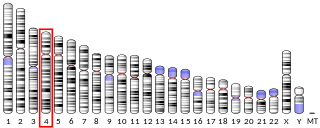Related Research Articles

Apolipoprotein C-IV, also known as apolipoprotein C4, is a protein that in humans is encoded by the APOC4 gene.

In genomics, a genome-wide association study, is an observational study of a genome-wide set of genetic variants in different individuals to see if any variant is associated with a trait. GWA studies typically focus on associations between single-nucleotide polymorphisms (SNPs) and traits like major human diseases, but can equally be applied to any other genetic variants and any other organisms.

Far upstream element-binding protein 1 is a protein that in humans is encoded by the FUBP1 gene.

Proline/serine-rich coiled-coil protein 1 is a protein that in humans is encoded by the PSRC1 gene.

Ventral anterior homeobox 1 is a protein that in humans is encoded by the VAX1 gene.

Transmembrane protein 18 also known as TMEM18 is a protein which in humans is encoded by the TMEM18 gene.

Glucosamine-6-phosphate deaminase 2 also known as GNPDA2 is an enzyme that in humans is encoded by the GNPDA2 gene.

Neuronal growth regulator 1 also known as NEGR1 is a protein which in humans is encoded by the NEGR1 gene.

Potassium channel tetramerisation domain containing 15 also known as BTB/POZ domain-containing protein KCTD15 is protein that in humans is encoded by the KCTD15 gene.

Like many other medical conditions, obesity is the result of an interplay between environmental and genetic factors. Studies have identified variants in several genes that may contribute to weight gain and body fat distribution; although, only in a few cases are genes the primary cause of obesity.
Expression quantitative trait loci (eQTLs) are genomic loci that explain variation in expression levels of mRNAs.

Asc-type amino acid transporter 1 (Asc-1) is a protein that in humans is encoded by the SLC7A10 gene.

Zinc finger protein 57 homolog (ZFP57), also known as zinc finger protein 698 (ZNF698), is a protein that in humans is encoded by the ZFP57 gene.

Interferon kappa, also known as IFN-kappa, is a protein that in humans is encoded by the IFNK gene.

Zinc finger protein 300 is a protein that in humans is encoded by the ZNF300 gene. The protein encoded by this gene is a C2H2-type zinc finger DNA binding protein and a likely transcription factor.

Monocarboxylate transporter 9 is a protein that in humans is encoded by the SLC16A9 gene.
Mega2 allows the applied statistical geneticist to convert one's data from several input formats to a large number output formats suitable for analysis by commonly used software packages. In a typical human genetics study, the analyst often needs to use a variety of different software programs to analyze the data, and these programs usually require that the data be formatted to their precise input specifications. Conversion of one's data into these multiple different formats can be tedious, time-consuming, and error-prone. Mega2, by providing validated conversion pipelines, can accelerate the analyses while reducing errors.
Eleftheria Zeggini is a director of the institute of translational genomics in Helmholtz Zentrum München and a professor at the Technical University of Munich (TUM). Previously she served as a research group leader at the Wellcome Trust Sanger Institute from 2008 to 2018 and an honorary professor in the department of health sciences at the University of Leicester in the UK.

HBS1 like translational GTPase is a protein that in humans is encoded by the HBS1L gene.
Gene Relationships Across Implicated Loci(GRAIL) is a free web application developed by Soumya Raychaudhuri at the Broad Institute with the goal of determining the relationships among genes in different disease associated loci through statistical analysis.
References
- ↑ "Lathrop takes helm of genome Innovation Centre" . Retrieved 2012-12-21.